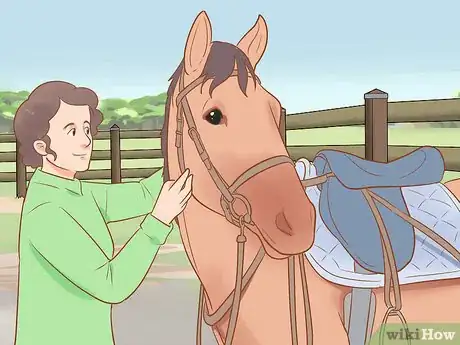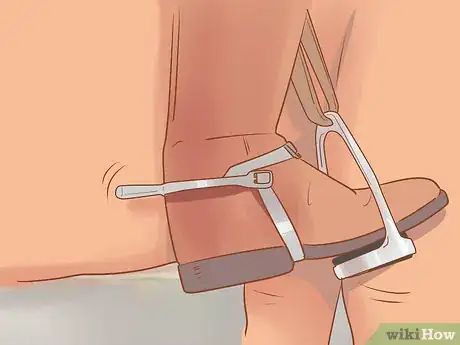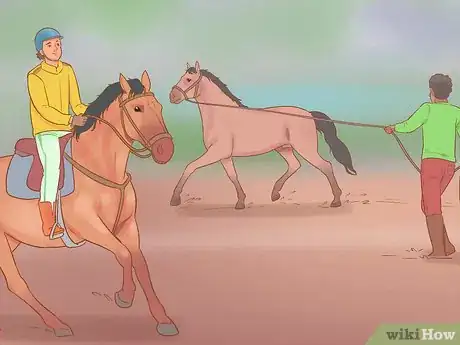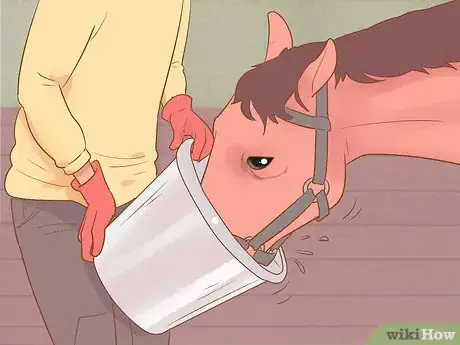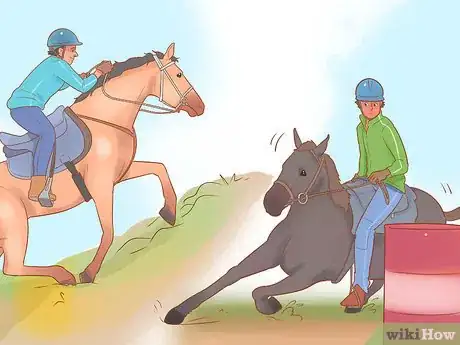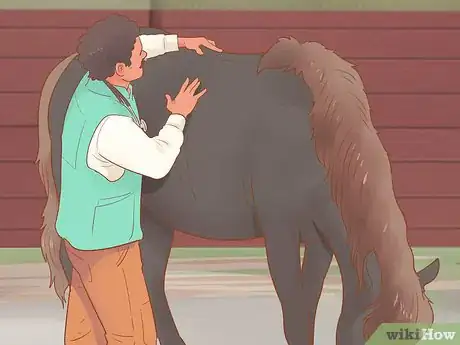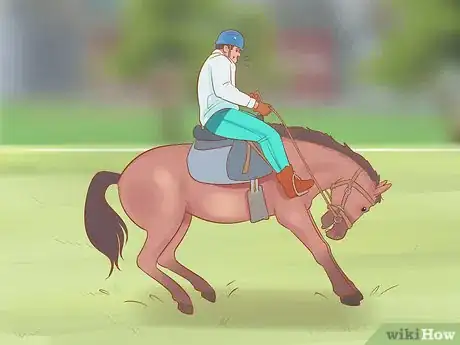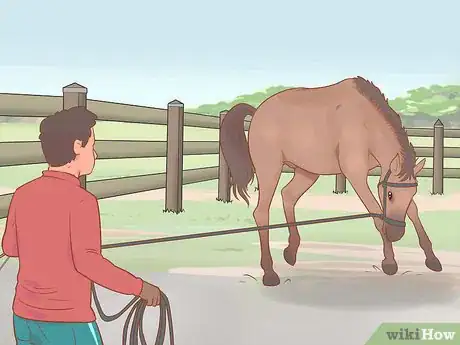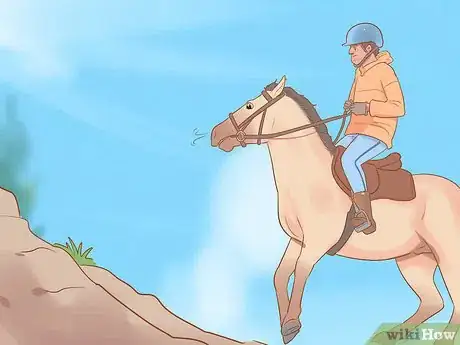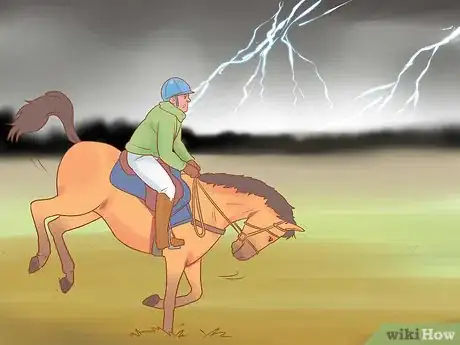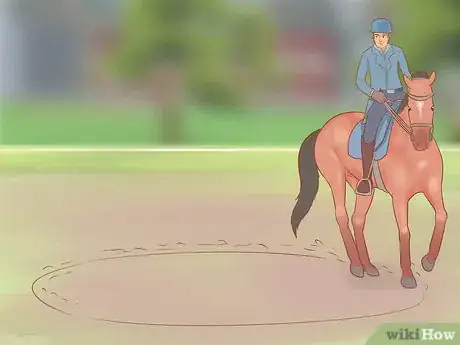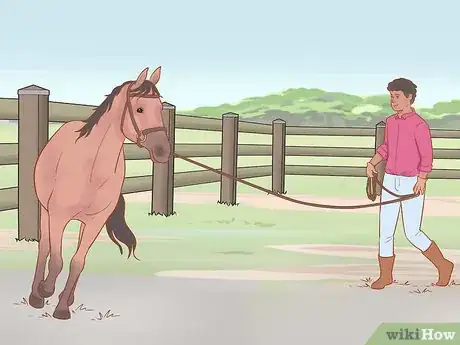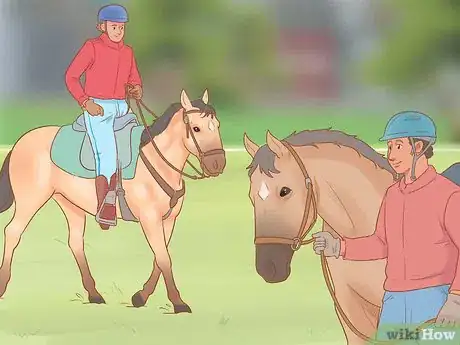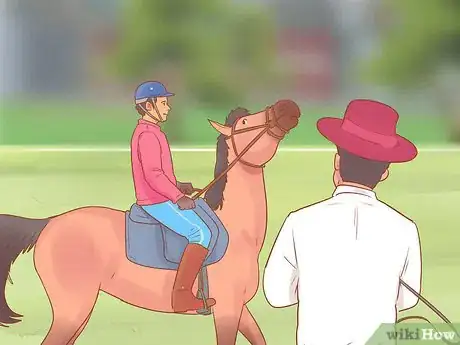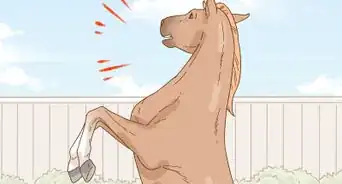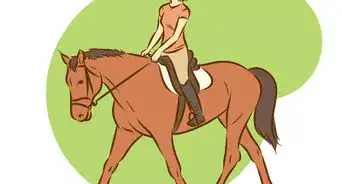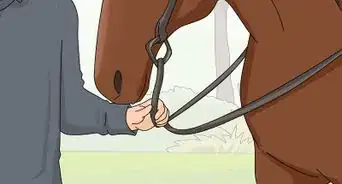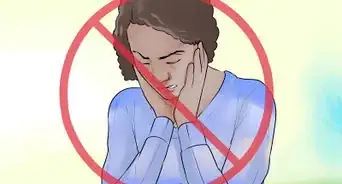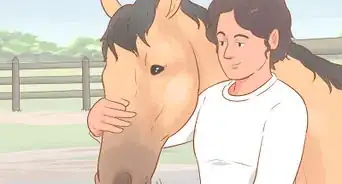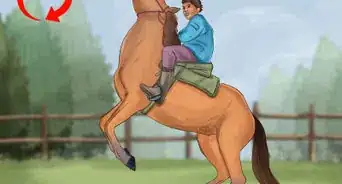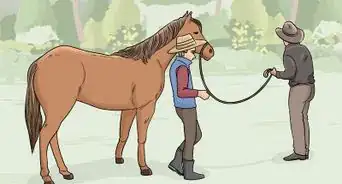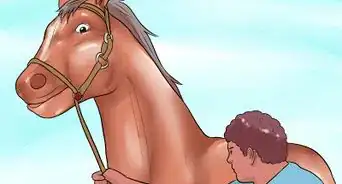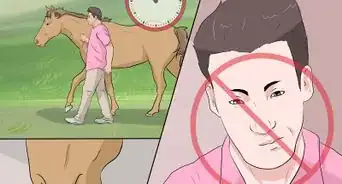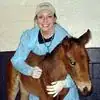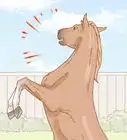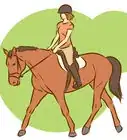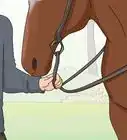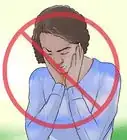This article was co-authored by Ryan Corrigan, LVT, VTS-EVN and by wikiHow staff writer, Danielle Blinka, MA, MPA. Ryan Corrigan is a Licensed Veterinary Technician in California. She received her Bachelor of Science in Veterinary Technology from Purdue University in 2010. She is also a Member of the Academy of Equine Veterinary Nursing Technicians since 2011.
This article has been viewed 38,746 times.
Crow hopping is when your horse gives a small buck by kicking its legs back, which may unseat you or force you forward in the saddle. Horses can buck for a variety of reasons, such as wanting to end a ride early. Although crow hopping is frustrating and sometimes painful for you, you can figure out why your horse is doing it. First, check your technique to make sure you’re not doing something to cause the bucking. If you don’t have any technique issues, consider if your horse's mood might be causing the crow hopping. Once you know the reason, you can work on a fix.
Steps
Checking Your Technique
-
1Make sure the tack fits your horse properly and doesn’t cause irritation. Pain or discomfort will make your horse unwilling to let you ride, resulting in crow hopping. Fortunately, this is a relatively easy fix. Make sure you’re properly fitting and securing each part of the tack so your horse is comfortable.[1]
- Additionally, look over your blankets or quarter sheet to look for possible irritants, such as hay, that might be stuck to it. If an irritant gets trapped under the saddle, your horse is going to be grumpy.
-
2Check your cues to verify you're using them correctly. A confused horse will act out, sometimes in the form of crow hopping. Your horse might be letting you know that it doesn’t understand what you want. Work on your cues and spend more time training your horse so it knows what to do.[2]
- Your horse may be frustrated, so cut it some slack. You both might benefit from some extra groundwork.
- Consider working with a trainer who can help you go back to basics and figure out any riding mistakes you might be making.
Advertisement -
3Recognize if you’ve taken a break from training your horse. A horse that hasn’t been in training may not want to obey you. It may start crow hopping in an attempt to get you to leave it alone. Additionally, it might not remember what it’s supposed to do, which might frustrate the horse.[3]
- If you think your horse might be crow hopping because of a gap in training, it’s best to get back into a training routine. Do additional groundwork with your horse to remind it what it’s supposed to do.
-
4Determine if you may be overfeeding your horse. An overfed horse can get overweight, sluggish, and tired. This can cause the horse to resist exercise, which includes a ride. Ask your vet to help you determine if your horse is overweight, then find out how much food is recommended for your horse to stay in shape. Adjust its diet accordingly.[4]
- If you don’t want to call your vet out, you can use weight tape or a livestock scale to check your horse’s weight.
-
5Consider if you’re pushing your horse to do too much too quickly. Your horse might crow hop if it’s not ready to do a certain activity. For example, it might not be physically ready to carry you at a gallop. This can make the horse feel overwhelmed, causing it to act out by crow hopping. Give your horse time to work up to what you want it to do.[5]
- This comes back to training. Be sure to spend the proper amount of time training your horse before pushing it during a ride.
-
6Have your vet check the horse for back pain. Just like humans, horses are susceptible to pinched vertebrae, sore ligaments, and inflamed or misaligned joints. If your horse is crow hopping, ask your equine vet to come out and do an exam. They can determine if your horse has any back or joint problems that might be causing pain and making it irritable.
- If your vet finds a problem, they may recommend injections to decrease inflammation in the problem areas. They can also refer you to a chiropractor who can help make your horse more comfortable.
Monitoring the Horse’s Mood
-
1Notice if crow hopping might be a means to avoid a ride. A lazy or inexperienced horse might not want you to ride it, and knocking you off the saddle is a great way to discourage you from riding. If you think this is the case with your horse, give it a hard workout to show it crow hopping won’t discourage you from making it work.[6]
- If you can safely stay on your horse, continuing the ride is the best way to show it that crow hopping won’t work. However, it’s not safe to stay on a horse that keeps crow hopping. Instead, you can do the groundwork to establish your role as alpha.
-
2Recognize if crow hopping cuts your horse’s work short. If you tend to put your horse back in its stable when it starts bucking or crow hopping, the horse may figure out the connection and take advantage of it. This can encourage it to start crow hopping as soon as it’s ready to go back to its stall to munch on some hay.[7]
- Don’t end a training session just because your horse is crow hopping, or it’ll learn to keep doing it. It’s better to work with your horse a little longer so it learns crow hopping will result in longer lessons.
-
3Look for a reason your horse may be afraid. A fearful horse might start crow hopping to resist a situation that makes it afraid. It might find a new trail scary, may be intimidated by the presence of an unfamiliar person or animal, or might be unused to the training you’re doing. If you think your horse may be afraid, take time to calm it down with a gentle voice and affection.[8]
- If you think it’s appropriate, remove the thing you believe is triggering the fear. For example, you might return to a familiar trail to calm a horse that's afraid of the unknown or pen up your dog if it's scaring the horse. Use your judgment to decide if your horse’s fear is reasonable.
- Once you’ve figured out what your horse is afraid of, you can start working on some desensitization training. This training involves gradually exposing the horse to whatever it fears until it becomes more comfortable and confident.
-
4Check the weather conditions if your horse crow hops occasionally. Some horses will get spooked by changing weather patterns. They might resist working if they see a rain cloud or feel the wind picking up. If your horse only crow hops occasionally, it’s possible that the weather is to blame.[9]
- Work on calming your horse if this happens. However, don’t put them up after they’ve been crow hopping, as doing so will encourage the behavior.
Stopping Crow Hopping
-
1Make your horse walk circles as discipline. You can also yell, “No!” to show it this behavior is unacceptable. This makes it clear to your horse that crow hopping is not tolerated and isn’t an effective way to get what it wants.[10]
- You can also reassert your dominance by giving your horse the “back up” command a few times. Training your horse to back up will help it realize that you are in charge.[11]
- Don’t ever punish your horse by striking it or verbally abusing at it. These types of punishments are counter-productive and will make your horse resent you.
-
2Do additional groundwork with your horse to break the habit. Groundwork exercises teach your horse that you’re in charge, plus they’re the best way to teach and reinforce cues you’ll use while riding. Practice your cues for starting, stopping, turning, and cantering before you start trying to ride your horse. This way the horse knows what you expect it to do.[12]
- For example, you might lunge your horse on a line to reinforce that you’re in charge.
- Doing groundwork allows you to train your horse without risking a fall.
-
3Get your horse to walk forward to stop the bucking motion. When a horse crow hops, it kicks its back legs out while keeping its front legs in place. That’s hard to do if the horse is walking forward! Cluck your tongue and give the horse a gentle spank on its hindquarters. If it doesn’t walk forward, dismount and walk it from the ground.[13]
- Always consider your safety. Working your horse from the ground may be your safest option.
-
4Work with a riding instructor or horse trainer if nothing else helps. You may not be able to break your horse’s crow hopping habit on your own, and that’s okay. If nothing you’ve tried helps or you feel like you’re too inexperienced, a riding instructor or horse trainer can help. Not only will they teach your horse what’s expected of it, but they’ll also help you improve your riding techniques and confidence.[14]
- Ask your equine vet or fellow riders for a recommendation for a good riding instructor or horse trainer. You can also search for one online.
- Talk to the instructor or trainer before you hire them to find out about their education, experience, and what type of training they provide.
Warnings
- If you get bucked off the horse, don’t immediately get back on it. This might result in injury, as it’s likely the horse will try to knock you off again. Instead, do some groundwork so your horse is still working without you being in danger.⧼thumbs_response⧽
References
- ↑ https://horseandrider.com/blog/horse-bucking-29849
- ↑ https://www.horsejournals.com/discipline-trail-horse
- ↑ https://www.horsejournals.com/discipline-trail-horse
- ↑ https://horseandrider.com/health/bucking-broncos-29839
- ↑ https://www.horsejournals.com/discipline-trail-horse
- ↑ https://horseandrider.com/blog/horse-bucking-29849
- ↑ https://horseandrider.com/blog/horse-bucking-29849
- ↑ https://www.horsejournals.com/discipline-trail-horse
- ↑ https://horseandrider.com/blog/horse-bucking-29849
